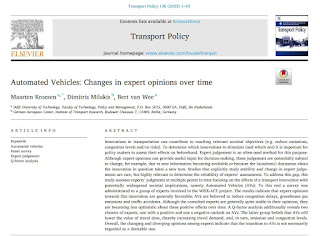Automated Vehicles: Changes in expert opinions over time
In our new paper with Maarten Kroesen and Bert van Wee, we explore the extent to which experts’ views change over time, focusing on the case of AVs. Experts from Europe (WISE-ACT COST Action) participated in our panel survey (2018-2021). We conclude that:
- Expert opinions towards AVs are generally favourable (e.g. about effects on congestion, greenhouse gas emissions and traffic accidents).
- Experts become less optimistic about AVs over time (particularly about the effects on traffic capacity).
- Two clusters of experts with diverging views on AVs (positive vs negative) were identified.
- Experts are not quite confident in assessing systemic, particularly indirect (land use, economic and public health), societal relevant impacts of AVs.
Factors that could explain these outcomes include:
- Experts, especially those taking a specialist rather than a generalist approach, might not be confident in assessing multiple AV impacts simultaneously that cross the boundaries of their expertise.
- Experts might feel less confident to express estimations for implications with limited background knowledge (i.e. long-term societal impacts of AVs).
- Experts tend to be over-optimistic in their (initial) assessments.
- Conflicting expert views naturally arise in fields involving highly complex, uncertain or even “wicked” problems.
Available open access here.


